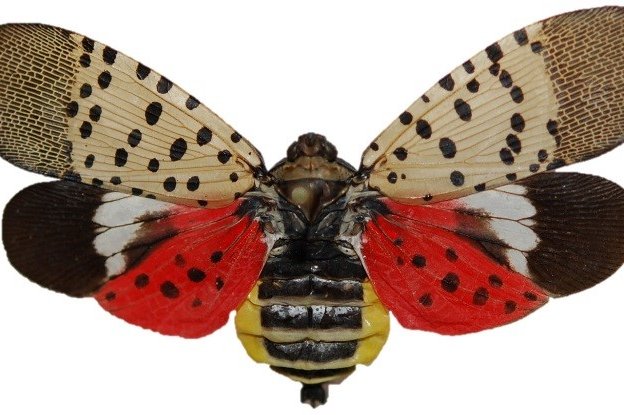
May 01, 2019
 Photo courtesy/Pennsylvania Dept. of Agriculture
Photo courtesy/Pennsylvania Dept. of Agriculture
Since 2014, the spotted lanternfly has spread across 14 counties in Pennsylvania and could cost Pennsylvania's fruit and tree industries more than $18 billion. New research using fungi to attack the pests has scientists 'cautiously optimistic.'
May has signified the beginning of spotted lanternfly season in eastern Pennsylvania for a half-decade, and 2019 is more of the same. The invasive insects have basically been unstoppable since 2014, but new research from Cornell University suggests the answer to beating back the bugs exists — and it’s located in Berks County.
Researchers found two fungal pathogens that could help curb the lanternfly, according to a new report from two Cornell professors of entomology.
The fungi, Batkoa major and Beauveria bassiana, were found to have killed sizable swaths of lanternflies in Berks County, near Reading, starting in late 2017, according to the Cornell Chronicle.
The first reports of the fungi killing lanternflies trickled in at the end of 2017, but Eric Clifton and Ann Hajek, the co-authors of the study, traveled to Angora Fruit Farm — part of Antietam Lake Park in Lower Alsace Township — in October 2018 to examine more reports near the fruit farm’s apple orchard.
“It was clear anywhere you walked, you’d see dozens of lanternflies killed by the Beauveria on the ground, and then you’d see cadavers all over the trees killed by Batkoa,” Clifton told the Cornell Chronicle. Just as interesting, Clifton said, was the scarcity of other insects killed by the fungi in the area.
Officially, the study found, a staggering 97% of lanternflies on tree trunks had been killed by the Batkoa, and among the insects found on the ground, the causes of death were effectively a half-and-half split between Batkoa and Beauveria.
Clifton did note that Batkoa major isn’t a well-known fungus, unlike Beauveria bassiana, but there seems to be potential for both to be used against lanternflies after further research.
The insects, which spread from Asia, feeding on trees and are harming local ecosystems, as well as hurting small business owners like vineyard and orchard growers. They pose an obvious threat to Pennsylvania’s fauna, so much so that the Pennsylvania Department of Agriculture, the U.S. Department of Agriculture, and Penn State University announced an initiative in March putting 150 researchers and experts on the case of developing strategies to fight lanternflies in the coming years.
“If you like apples, if you like grapes and wine, if you like beer,” Clifton said in the Cornell Chronicle, “spotted lanternflies can attack those, and that has growers worried.”
Follow Adam & PhillyVoice on Twitter: @adamwhermann | @thePhillyVoice
Like us on Facebook: PhillyVoice
Add Adam's RSS feed to your feed reader
Have a news tip? Let us know.